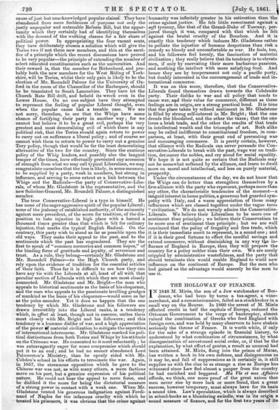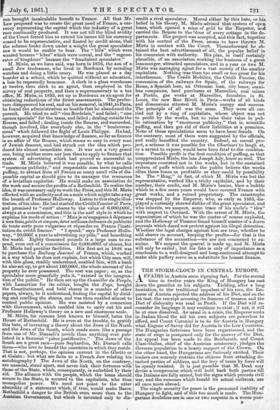IKE HOLLOWAY OF FINANCE.
IN 1848 M. Mires, the eon of a Jew watchmaker of Bar- deaux, who had been by turns a tax-agent, a wine- merchant, and a commissionnaire, failed as a stockbroker in a small way on the Bourse. In 1860 the arrest of M. Mires affected credit in half the capitals of Europe, reduced the Ottoman Government to the verge of bankruptcy, almost ruined the combination of Greeks who feed England with foreign corn, and was held by many observers to have shaken seriously the throne of France. It is worth while, if only for the sake of a strange episode in financial history, to understand by what combination of circumstances, by what disorganization of accustomed social order, or, if that be the explanation, by what effort of genius, a result so unusual bad been attained. M. Mires, flung into the prison of Maas, has written a book in his own defence, and disingenuous as it may be, and full of suppressions as it certainly is, it still supplies us with the clue to as strange a rise as Europe has witnessed since Law fled almost a pauper from the country he had enriched and beggared. Ha Fie at tnes Affaires affords, we think, one more proof of the great axiom that men never rise by mere luck or mere fraud, that a great success, however temporary, must always have for its basis a sound idea. Law's speculation, which is always described in school-books as a blundering swindle, was in its origin a sound measure of finance, and for the first two years of its run brought incalculable benefit to France. All that Mr. Law proposed was to create the great need of France, a cur- rency representing the capital which the industry of a great race continually produced. It was not till the blind avidity of the Court forced him to extend his issues till his currency ceased to be representative, and floated by credit alone that the scheme broke down under a weight the great speculator saw it would be unable to bear. The "bills" which were wanted became" kites" which were unreal, and the "regene- rator of kingdoms" became the "fraudulent speculator."
M. Mires, as we have said, was born in 1816, the son of a small Jew tradesman, who lived in Bordeaux by mending watches and doing a little usury. He was placed as a day boarder at a school, which he quitted without an education, a loss he repeatedly bemoans. A clerk in a glass warehouse at twelve, then clerk to an agent, then employed in the survey of real property, and then a supernumerary in a tax office, M. Mires, in 1835, set up in Bordeaux as an agent for obtaining reductions of the direct assessments. The prefec- ture disapproved his zeal, and on his removal, in1841,toParis, he found the administration so hostile that he abandoned the pursuit. He tried to sell" vine Bordelais," and failed ; " une agence speciale" for the taxes, and failed ; dealing outside the Bourse, and failed ; dealing inside the Bourse, and succeeded, though involved, like everybody else, in the " bouleverse- ment" which followed the flight of Louis Philippe. He had, however, acquired that knowledge of finance, so far as finance is an affair of the Bourse which seems so easy to every man of Jewish descent, and had struck out the idea which pro- duced his almost immediate rise. It was not a very grand one, being neither more nor less than to apply to finance that system of advertising which had proved so successful in trade. M. Mires believed it was possible, by what he calls "enormous publicity," and respectable men term impudent puffing, to attract from all France so many small rills of dis- posable capital as should give to its manager the resources of a leviathan capitalist. He would make an association do the work and secure the profits of a Rothschild. To realize the idea, it was necessary onlyto work the Press and this M. Mires effected with an audacityand on a scale which might take away the breath of Professor Holloway. Listen to this single illus- tration of his idea: He had started the CreditFoncier of Paris, and promised to "emit" shares to the value of 6,000,0001., always at a commission, and this is the miff style in which he explains his mode of action: " Maisje m'engageais I depenser mes frais, perils et risques, dela millions defrancs de publicite de toute sorte pour vulgariser et repandre en France l'insti- tution du credit foncier." "I spend," says Professor Hollo- way, "20,0001. a year in advertising my pills," and benefiting the world. Eighty thousand pounds is a large sum to ex- pend, even out of a commission for 6,000,0001. of shares, but M. Mires had peculiar facilities. His first act in 1848 was to purchase the _Railway lournal of France, which, worked in a way which he does not explain, but which City men will, with this gloss, readily understand, enabled him, with a bank he also setup, to get about 160,0001., the whole amount of the preperty he ever possessed. The rest was paper ; or, as the speculator more gracefully puts it, "existed in the imagina- tion of the public.' He then set up the Conseiller du Peuple, with Lamartine for its editor, bought the Pays, bought the Constitutionnel, and held shares in a number of other papers, always be it understood, finding the capital by divid- ing and reselling the shares, and was thus enabled almost to control 'public opinion. He was assisted by a connexion with Government, which enabled him to carry out his and Professor Holloway's theory on a new and enormous scale. M. Mires, for reasons best known to himself, hates the House of Rothschild. ' He is even at the trouble, to gratify this hate, of inventing a theory about the Jews of the North and the Jews of the South, which reads more like a passage from one of Mr. Disraeli's novels than anything ever pub- lished in a financial "piece justificative." The Jews of the South are a great race---pure Sephardim, Mr. Disraeli calls them—who love to benefit the countries in which they reside. That is not, perhaps, the opinion current in the Ghetto or at Galata; but what are facts to a French Jew relating his autobiography ? The Jews of the North, on the contrary, are unsocial, stand apart, and never link their fortunes with those of the State, which, consequently, is enfeebled by their aid. The alliance with the people, which the loans should secure to the State, is secured to the capitalists, who thus monopolize power. We need not point to the utter absurdity of a statement which, if true, would make Baron Rothschild a danger to the British even more than to the .A.ustrian Government, but which is invented only to dim- credit a rival speculator. Moved either by this hate, or his belief in his theory, M. Mires advised that system of open loans, which opened a mine of gold to the Emperor, and carried the Bourse to the 'door of every cottage in the de- partments. His project was accepted, and this fact, together with his control of the Press, seems to have thrown M. Mires in contact with the Court. Thenceforward he ob- tained the best advertisement of all, the popular belief in his connexion with authority. His plan, in itself certainly plausible, of an association working the business of a great loanmonger, attracted speculators, and in a year or two H. Mires was managing agent for a vast society of the smaller capitalists. Nothing was then too small or too great for his interference. The Credit Mobilier, the Credit Foncier, the concession of the railways for Spain, of the railways for Rome, a Spanish loan, an Ottoman loan, city loans, omni- bus companies, land purchases at Marseilles,. coal mines at Portes, gas works at Marseilles, foundries in St. Louis, the new Rue Rivoli in Paris—works of all kinds and dimensions attested M. Mires's energy and success. The principle of all was the same. They were all car- ried out by a ring of capitalists, whose object was not to profit by the works, but to raise their value in pub- lic estimation by "enormous publicity," that is, scientific puffing, and then get rid of their liabilities at a premium. None of these speculations seem to have been frauds. On the contrary, most of them were suggested by the officials, and really benefited the country. Indeed, an unreal pro- ject, a scheme it was possible for the Charivoiri to laugh at, or a savant to expose, would have been fatal to the combina- tion. Possible profit is the first condition of puffing, as that unappreciated Mires, the late Joseph Ady, knew so well. The imposture consisted not in the works, but in the sustained system of puffs which made the public believe the works often three times as profitable as they could by possibility be. The "Ring," in fact, of which M. Mires was but the representative, worked like a tricky capitalist, and by their number, their credit, and M. Mires's brains, blew a bubble which in a few more years would have covered France with great works, and a ruined proprietary. The catastrophe was stopped by the Emperor, who, as early as 1853, dis- played a curiously shrewd dislike of the great speculator, and who inherits, we suspect, some trace of his uncle's "idea" with respect to Ouvrard. With the arrest of M. Mires, the organization of which he was the centre of course exploded, and the Holloway of Finance found himself master of a dozen journals which dared not protest against his illegal detention. Whether the legal charges against him are true, whether he sold shares on account, keeping the profits—for that is the substance of the accusation—we are not concerned to ex- amine. We suspect the quarrel is made up, and M. Mires will only be exiled ; but his fate is only of importance as a conclusion to a well-designed and long-continued attempt to make able puffery serve as a substitute for honest finance.































 Previous page
Previous page